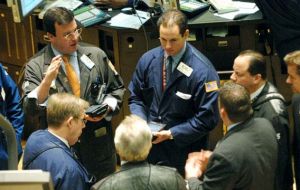MercoPress. South Atlantic News Agency
US markets remain volatile; in EU risk pricing “normalizing”
 Euroshares fall in morning trading on Wall Street slide overnight on credit woes
Euroshares fall in morning trading on Wall Street slide overnight on credit woes United States shares have fallen again with problems in the mortgage sector continuing to have an adverse effect on market sentiment but also on warnings from two big retailers Wal-Mart and Home Depot.
The Dow Jones closed down 208 points or 1.6% at 13,029. The more technology- based Nasdaq index fell 43 points or 1.7% at 2,499. The falls came despite the Federal Reserve saying it would inject more funds into financial markets if needed. To ease fears over available credit, sparked by the downturn in the mortgage sector, the Fed has already pumped billions of dollars of emergency funds into the banking system in recent days - twice on Friday and again on Monday. The European Central Bank (ECB) and the Bank of Japan have made similar moves. On Tuesday the ECB injected another 7.7 billion euros into the markets but said that conditions were returning to normal. Wall Street's falls knocked European stocks, with London's FTSE 100 closing 1.2% lower and Frankfurt's Dax falling 0.7%. In Latinamerica the main markets also lost ground: Brazil's Bovespa 2.9%; Mexico's 2.4%; Argentina's Merval 1.74% and Chile's IPSA, 2.44%. In the US Tuesday's main faller was Wal-Mart, the world's biggest retailer, which fell 5.1% after lowering its profit forecast because its customers are straining under economic pressures such as high oil prices. Also down sharply was another retailer, Home Depot, which fell 4.9% after warning that its profits would fall this year as a result of the sluggish housing market. From Frankfurt the European Central Bank issued a statement from President Jean-Claude Trichet, calling "on all parties to keep their composure", thus helping "to consolidate a smooth return to a normal assessment of risks in liquid markets" Trichet said the ECB "has provided in particular the liquidity which was needed to permit an orderly functioning of the money market". "We experience a period of market nervousness, a period in which we see increased volatility in many markets and a significant re-appreciation of risks. In some respects, what has been observed can be interpreted as a normalization of the pricing of risk". "We are now seeing money market conditions that have gone progressively back to normal. The Euro system will continue to monitor the situation whilst Euro area financial markets in general are going back to normal functioning".




Top Comments
Disclaimer & comment rulesCommenting for this story is now closed.
If you have a Facebook account, become a fan and comment on our Facebook Page!